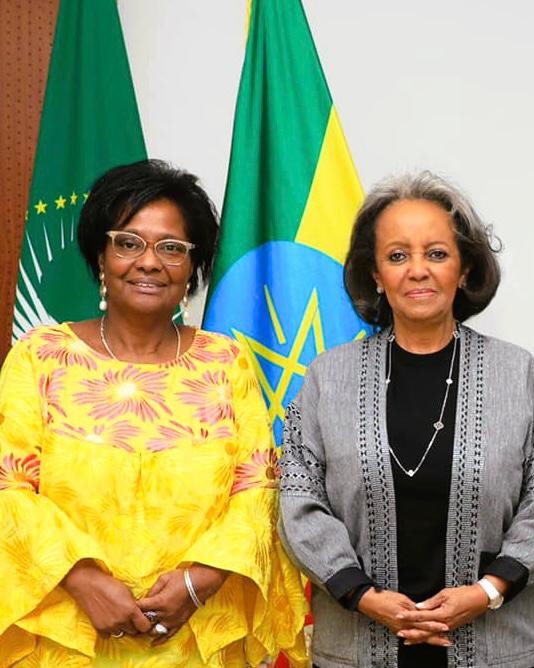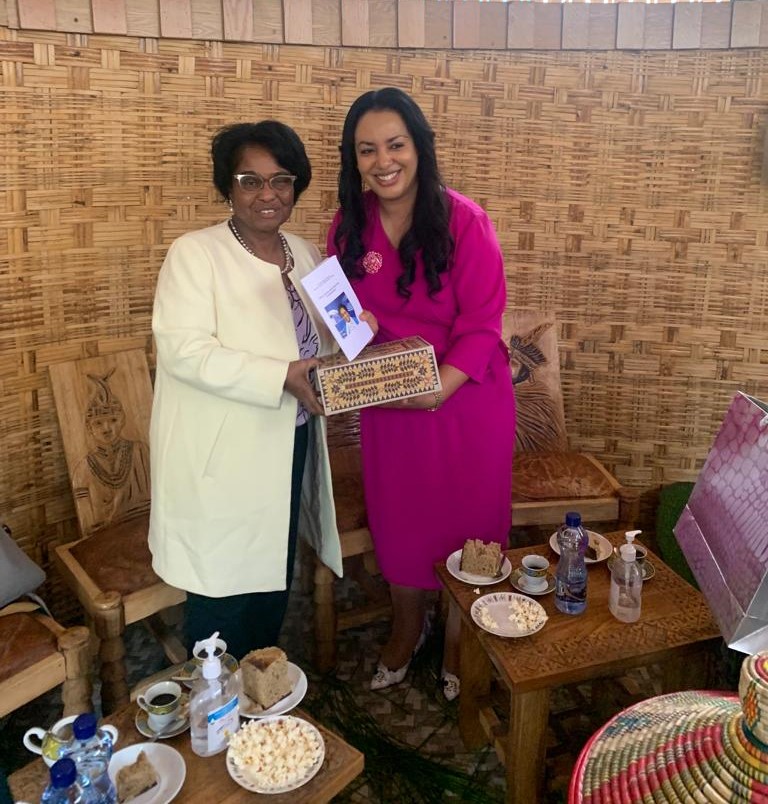As First Vice-Chair of the Committee on Development (DEVE) of the European Parliament and Substitute Member of its Committee on Women‘s Rights and Gender Equality (FEMM), Dr Pierrette Herzberger-Fofana took part in the Parliament’s recent Mission to Ethiopia. The Green politician reports on the Mission.

Historical and geopolitical aspects
The Federal Republic of Ethiopia has a population of around 125 million, making it the second most populous country in Africa. Ethiopia is one of the few African countries that has not really been colonised by European powers. The current territory was consolidated in the 19th and 20th centuries after the battle of Adoua in 1896 with Italy. Ethiopia maintained ist independence until the rise of Fascism. Mussolini wanted a colonial empire and Italy partially occupied Ethiopia from 5 May 1936 to 5 May 1941. After being invaded by Italy, Ethiopia regained its independence before the end of the Second World War. The capital Addis Ababa is the headquarters of the African Union.
The Horn of Africa, and Ethiopia in particular, maintains diplomatic relations relations with the European Union. These relations between the EU and Ethiopia are based on the Cotonou Agreement, Articles 8 to 13 of which define the bilateral political dialogue between the two parties, as well as on a series of other conventions and political commitments. The EU and Ethiopia can look back on 42 years of constructive bilateral relations in areas, which vary from development cooperation to trade, and economic development, the consolidation of democratic institutions, regional peace and security, as well as migration.

European Parliament. Mission to Ethiopia
As vice-chair of the Development Committee (DEVE) and substitute member of the Committee on Women‘s Rights and Gender Equality (FEMM) within the European Parliament, I took part in our mission to Ethiopia. This gave me the opportunity to present our work within the FEMM committee. In this capacity, with my two other colleagues from the Foreign Affairs Committee and Human Rights commission (LIEBE), we paid a courtesy visit to Her Excellency Mrs Sahle-Work Zewde, President of the Republic of Ethiopia since 2018. The President gave an overview of the situation in her country. Our visit was overshadowed by the conflict with Tigray, in the north of the country. During our meeting, I gave the President and the Minister for Women my brochure on “Female Genital Mutilation and Human Rights”.
Ethiopia and female genital mutilation in Ethiopia
Ethiopia has a high incidence of excision. In rural areas, mutilation persists in the 15-49 age group. 98.5% of women have undergone clitoridectomy and/or infibulation, the most severe form of excision.
The Tigray region has the lowest prevalence, at 24.0%. Although these practices are officially prohibited, 60-80% of women have undergone FGM, and 4% are infibulated. Whether practised by Christians or Muslims, Orthodox or Protestant, this custom has long been de rigueur for young girls.
According to a recent study carried out in Ethiopia, the number of girls concerned has fallen considerably over the last twenty years. Whereas in 2000, just under 52% of girls aged between zero and 14 were still subjected to this practice, in 2016 this figure had fallen to 15.7%. Increased education and changing social norms have influenced this decline. In Ethiopia, FGM was banned by law in 2004.
Addis Ababa hosted the first headquarters of the African Inter-Committee to Combat Traditions Affecting the Health of Women and Girls (IAC; CI-AF), marking the determination of committed women and men in the region to put an end to an obsolete tradition.
Situation in Ethiopia
Conflict and insecurity in Ethiopia are the cause of a great deal of sexual violence of which women and girls are the main victims. Furthermore, rape victims have no access to the services responsible for providing help in such cases, especially as a culture of silence prevails in Ethiopian society. Women are afraid to ask for the humanitarian aid to which they are entitled to, for fear of being stigmatised. Moreover, according to Amnesty International‘s official reports, this sexual violence takes on a disproportionate dimension in times of war.
Then, it is clear that rape and sexual violence have been used as a weapon of war to inflict lasting physical and psychological harm on women and girls in Tigray. Hundreds of them have been subjected to despicable treatment designed to make them lose their dignity and dehumanise them according to Amnesty‘s Secretary General, Agnès Callamard.
The feminisation of migration to the Middle East
Dazzled by the promise of a lucrative work contract with good pay, many young girls are heading to the Gulf States. Those young girls are the most vulnerable, as they have no protection in Arab countries. Then there they find themselves being sexually abused and consequently lose their dignity.
As part of our visit, we visited the reception centre for young girls returning from the Gulf countries, Saudi Arabia, Qatar and the Emirates, who are victims of sexual abuse.
The suffered abuse leads to unwanted pregnancies and forced repatriation to their countries of origin. They are also rejected by their families on their return. Additionally, these young girls face social exclusion, abandonment issues and poverty. They can find refuge in this reception centres across the county, which works to reintegrate them into Ethiopian society.

Preventive measures in Ethiopia
As a result of the armed conflict and climate change, health facilities have been destroyed, leading to a shortage of medical supplies and health personnel. This has, consequently, disrupted access to sexual and reproductive health services, as well as emergency care for pregnancy complications and maternal health.
UNFPA works on the ground to provide essential protection and health services for women and girls in eight regions of Ethiopia. Their humanitarian action places the sexual and reproductive health of women and girls at the heart of their priorities, in particular by providing medical and psycho-social assistance to survivors of physical and sexual violence.
Our visit to the African Union.
The gender experts at the African Union gave us an overview of the issues affecting women, which are domestic violence, female genital mutilation and early marriage.
The European Union is funding Project “Spotlight”, which aims to abolish female genital mutilation and early marriage. The commitment of civil society organisations is impressive.
We were able to speak to a number of women‘s associations, including those of women lawyers, EWLA, NEWA, Siqqee and Setawee.
Local women‘s associations are helping to build capacity to meet urgent needs respond to urgent needs and enable medical childbirth and the clinical management of rape.
Women‘s NGOs are demanding equal participation of men and women in the talks. They want parity at the negotiating table to speed up the peace process. Their participation could be beneficial for everyone. Ethiopian women are asking for our support to strengthen their demands. They want to play an active role in the Ethiopian population.
Conclusion
Civil society organisations are working with international organisations on humanitarian issues to bring relief to the people of Ethiopia. They place the sexual and reproductive health of women and girls at the heart of their priorities, in particular by providing medical and psycho-social assistance. Drought, famine and floods have devastated a large proportion of livestock and damaged the food crops of millions of farmers. These two scourges,coupled with climate change, have increased food insecurity and malnutrition. Additionally we should not forget the conflict with Tigray and the impoverishment of the population.
—
About Dr Herzberger-Fofana, MEP:
Dr Pierrette Herzberger-Fofana was elected to the European Parliament on 26 May 2019 as a candidate of Bündnis 90/Die Grünen (Alliance 90/The Greens) and has since been campaigning for a democratic, humane Europe as an MEP.
She is First Vice-Chair of the Committee on Development (DEVE) and the Delegation for Relations with the Pan-African Parliament (DPAP), Co-President of the European Parliament’s Anti-Racism and Diversity Intergroup (ARDI) and a member of the delegation to the Cariforum-EU Parliamentary Committee (DCAR), where ‘Cariforum’ stands for the countries of the Caribbean region.
She is also a substitute in the Committee on Foreign Affairs (AFET) and the Committee on Women’s Rights and Gender Equality (FEMM), as well as a substitute in the Delegation to the ACP-EU Joint Parliamentary Assembly (DACP) – ACP standing for African, Caribbean and Pacific countries.
 THE AFRICAN COURIER. Reporting Africa and its Diaspora! The African Courier is an international magazine published in Germany to report on Africa and the Diaspora African experience. The first issue of the bimonthly magazine appeared on the newsstands on 15 February 1998. The African Courier is a communication forum for European-African political, economic and cultural exchanges, and a voice for Africa in Europe.
THE AFRICAN COURIER. Reporting Africa and its Diaspora! The African Courier is an international magazine published in Germany to report on Africa and the Diaspora African experience. The first issue of the bimonthly magazine appeared on the newsstands on 15 February 1998. The African Courier is a communication forum for European-African political, economic and cultural exchanges, and a voice for Africa in Europe.
































